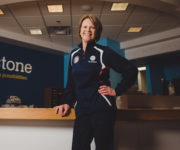Meet the Match
A Paraguayan Woman with a Paralympic Vision
The ethos of the Paraguayan spirit is defined as garra, a Spanish word for fighting spirit. This garra was tested in Leticia Baez Houdin’s life as a teenager dealing with the birth of her daughter.
Born into a very close-knit family in Asuncion, Paraguay, Leticia was a promising basketball player with hopes of a career on the national team. The birth of her daughter was a test: she was a young woman balancing work, studies and motherhood.
Despite the challenges, Leticia persevered. Putting down the basketball, she earned a bachelor’s degree in sports science from the Autonomous University of Asuncion and has spent the past six-and-a-half years working in the Ministry of Sports, promoting a variety of sports and serving as a coach and sports official.
The entire time her daughter has been there as a driving force for her success.
“In 2016, when I was given the opportunity to promote goalball in Paraguay, I was very afraid,” Leticia recalls. “And she said, ‘Mommy, you have to do it.’ That’s how she is. She’s always pushing me.”
Originally hired by the ministry as a sports technician in the sports development department, Leticia’s career in Paralympic sports began in 2013 when she volunteered on a wheelchair rugby project. Soon afterward, she became involved with organizing clinics, and eventually became a basketball referee and coach with Special Olympics.
In 2016, Leticia became the first Paraguayan woman to participate in the Paralympics when was chosen to serve as a technical official for wheelchair rugby at the Rio Games. Last year, the government supported the creation of the Paraguayan Paralympic Committee and she was named vice president and CEO of the organization.
For Leticia, the benefits of sport for Paraguayans with disability are endless. It provides discipline, responsibility and the opportunity to interact with a community of other people. Most importantly, it gives them the chance to live a new, second life.
This is especially important in the face of the challenges faced by this community. There is generally a lack of information about disability across society, and the education system does not address the issue so society remains ignorant about it. This is exemplified in the limited statistics available on disability. According to the most recent official statistics from the 2002 census, less than 1 percent of the Paraguayan population was identified as disabled, while an international analysis of the 2012 data suggests this number is closer to 12 percent or approximately 780,000 people.
“Disability in Paraguay is seen an inconvenience,” Leticia says. “From the primary to university level, people aren’t educated about it. Then, in the workplace, human resource departments aren’t prepared to deal with a person who has a disability. As part of the law, government institutions must hire a person with a disability. But, it is seen as an obligation to incorporate a person with a disability— not as their right to be able to work in that place like anyone else.”
Social discrimination manifests itself in widespread inaccessibility. There is little thought put into ramps, elevators, and accessible bathrooms. And, on the occasion where the facility is not the challenge, there is a lack of accessible public transportation to get to these spaces.
By developing Paralympic sport and giving prominence and influence to individuals with disabilities, Leticia and her team seek to address these challenges. While the NPC was only established in 2017, there are already other federations that are established or in the process of being established: wheelchair rugby, swimming, football, judo, canoeing, athletics and goalball (2018). And Leticia plays an influential role in how they collaborate with the NPC and develop sport to maximize its reach across the country.
By participating in the U.S. Department of State Global Sports Mentoring Program, Leticia learned more about the tools and strategy she can utilize to encourage everyday people to become involved with Paralympic sports. To accomplish her goals, she was partnered with mentor Tina Acosta, director of program outreach for Turnstone, a Gold Level Paralympic Sports Club annually serving more than 2,200 individuals through adaptive sports and inclusion programs. Turnstone is also home to the U.S. men’s Paralympic goalball team. With more than a decade of experience in program outreach, Tina provided valuable insight about how to engage community members with grassroots and elite sports programming. In turn, Leticia brought her experience as a sports administrator in a fresh environment for adaptive sports development. Together, the duo worked to make an impact that will stretch across continents and extends to future generations in the U.S. and Paraguay.

